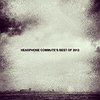Shine the light
Tell us a bit about the selection process for deciding on what to write about, please. What sources will you draw from for research purposes and how much time goes into research, information gathering and fact-checking in general?
I'd like to say that it's almost random. But since I don't believe in randomness or luck, I'd like to say that it's predetermined. It's just not really decided by myself. One thing leads to another, and I'm playing this piece of music or that. My hand reaches for a glass of wine, and then it reaches for a shrink wrapped album. The last track on an album ends, and seamlessly blends into the first from the new. Of course this selection is made easier by a stack of promos that is constantly being sorted and rearranged on my desk. And the CDs come from the labels and artists that I already love. So the whole flow is pretty organic, a perpetually self-feeding fire.
Once I'm ready to cover the album, I usually start with my thoughts and evoked feelings, followed by the facts that I gather with the accompanying press release, or some background available on the artist's site. I listen to a particular piece of music probably half a dozen times before I sit down to write, and the draft copy may take another hour. Later I return for revisions, check for flow, and finally copy-edit in preparation for publication. Occasionally I will reach out to artists to fill in the missing details, and present them with a draft copy for their fact-checking if there is no press sheet with the release. I'd like to say that all of the content goes through thorough fact checking, and if I happen to miss something, it is usually quickly pointed out and corrected.
As more and more people are producing and releasing music, there has been an exponential growth in promotion agencies. What's your perspective on the promo system? In how far is it influencing your choice of articles and topics, in how far is it useful for pre-selection, in how far do you feel it is possibly undermining journalistic freedom?
Hmm… That's an interesting question. I get about a dozen or more PR related spam per day. Sometimes I'm not even sure how I got onto their mailing lists. Most of these get filtered out so that I can concentrate on real content. There are a few promotion agencies that I enjoy working with. These are the ones that align with my taste in music, and somehow, almost magically have the right attitude with presentation: a personal email, a carefully packaged promo, a unique introduction to a new sound. And this works really well. On many occasions I have been presented with a rather delightful surprise which led me to another discovery in music.
Here's the bottom line, it's easy to tell whether or not a particular piece of promotional material has been hastily put together and jammed down the internet tubes towards the undiscerning hungry masses. If someone has spent only five minutes in blasting the templates, then why should I spend even a minute on it to consume? I'm hoping that others would recognize the logic behind this approach as well, so that we could all create long-lasting and meaningful relationships in the industry.
How do you see the role of music journalism in the creative process? Should it amplify public taste, distinguish the good from the bad, inform, promote artists, or, as Howard Mandel put it, “illuminate, educate and entertain” readers? Do you feel that, as part of your work, music needs to be explained or should it retain its “inexplicable nature”?
Your question touches on a long and elaborate debate I have had with my friends (and with myself) on many occasions. On the one hand, my writing is geared more towards recommendations. I'm not much of a 'critic', you see. So my writing is centred around positive words inspired by the need to share a new discovery. They are full of appreciation for music and excitement to tell the world about my latest find.
That being said, there are times when I choose to explain a particular aesthetic, and why I find it appealing, even though from the first listen it may sound questionable. For example, how can one derive artistic pleasure from listening to an 18-minute piece comprised of field recordings of a compressed fourteen-hour aural document from Kenya's animal habitat? Yet at the same time I feel that a person must hear it at least once in their lifetime.
I also think that a great musician must be exposed to all genres of music. Therefore, I often point ambient artists towards a dark pounding corner of a warehouse so that they can face their fears and angst. So in a way, I feel that my writing does indeed inform and amplify, while attempting to illuminate and entertain. I'd like the listener to learn how to listen.
Music journalism has frequently been attacked for merely expressing opinion. On the other hand, it is precisely personal interest in an artist and/or his work which frequently provides for a stimulus to delve into them in more depth. How would you describe the importance of subjectivity for your writing?
Well, if a journalistic piece is simply regurgitating facts from a press release, what purpose does it serve? Opinion, at this point, is precisely what matters. And if a particular reader identifies with my specific taste, I am hoping that my opinion is exactly what they're looking for. My personal feelings not only affect what I write about, but also may leak into a current perception of a piece.
Many people have complimented me on my taste in music, but I'm not sure how to accept their praise. I love great food and intelligent fiction and a carefully cared for bottle of spirit. So it feels easy for me to pick up on good sounds when I come across them. Of course I tend to be subjective towards individual artists and labels - yes, I demand a higher level of standards from distinguished musicians, while perhaps giving bigger praise to a smaller label for their enormous accomplishment to stay true to their beliefs. I've seen conflicting reviews on the same piece of music, and it is precisely these separate views from a varied perspective that interest me the most.








